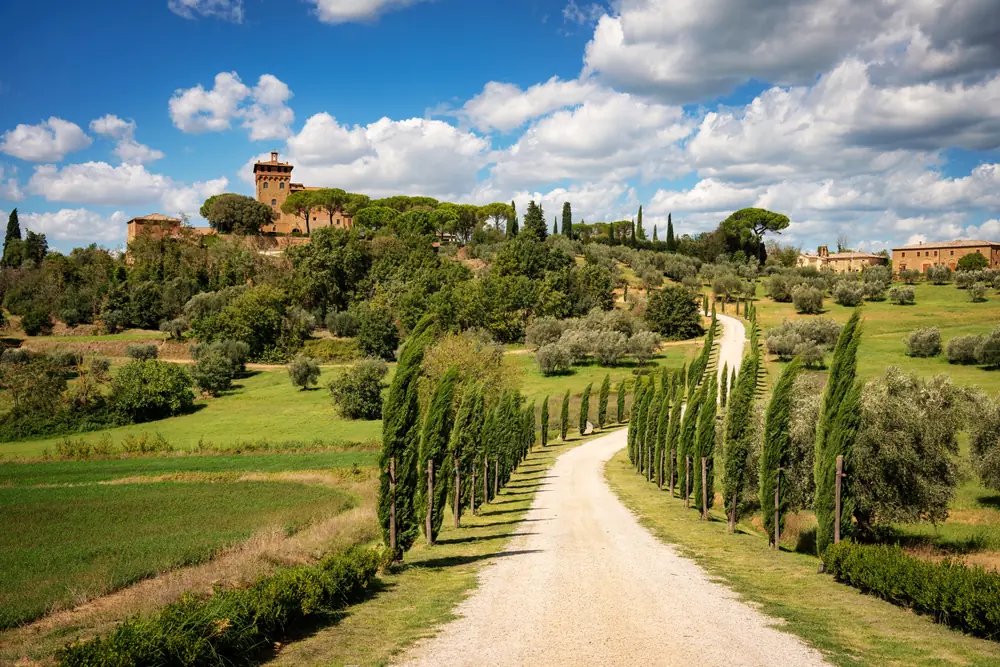
Best Places to Visit in Tuscany – Explore the Timeless Beauty of Italy’s Heartland
Introduction:
Tuscany is a region in central Italy that is well-known for its world-class wines, medieval cities, and rolling hills. As one of the best places to visit in Tuscany, this charming area offers a unique combination of breathtaking scenery, vibrant cultural history, and delectable food. With its medieval villages, wineries, and olive groves, Tuscany provides a quintessential Italian experience that embodies all the charm Italy has to offer.
How to Reach Tuscany:
By Air:
- Florence Airport (FLR): The main airport in Tuscany, offering international and domestic flights.
- Pisa Airport (PSA): A major airport serving the western part of Tuscany, with flights from various European cities.
By Train:
- Trains: Tuscany is well-connected by train, with major routes running through Florence, Pisa, and Siena. High-speed trains from cities like Rome and Milan make travel convenient.
By Car:
- Driving: Renting a car is an excellent way to explore Tuscany’s countryside and small towns. Major highways and scenic routes connect key destinations.
By Bus:
- Regional Buses: Public buses and shuttle services connect towns and cities within Tuscany, providing a cost-effective way to travel.
Best Time to Visit:
- April to June: Spring offers mild temperatures and blooming landscapes, ideal for exploring the countryside and historic sites.
- September to October: Autumn features harvest festivals, pleasant weather, and fewer crowds, making it perfect for wine tasting and sightseeing.
- July and August: Summer brings warmer temperatures and peak tourist season, with vibrant festivals and events, though it can be crowded.
Top Destinations: Best Places to Visit in Tuscany
Florence: The heart of Renaissance art and architecture, Florence boasts landmarks like the Uffizi Gallery, the Florence Cathedral, and the Ponte Vecchio.
Siena: Known for its medieval architecture and the Palio horse race, Siena features the stunning Piazza del Campo and the Siena Cathedral.
Pisa: Famous for the Leaning Tower of Pisa, this city also offers the beautiful Piazza dei Miracoli and the Pisa Cathedral.
San Gimignano: A medieval hill town renowned for its well-preserved towers and charming streets. It’s often referred to as the “Medieval Manhattan.”
Lucca: Known for its intact Renaissance walls, Lucca features historic buildings, churches, and beautiful cobblestone streets.
Chianti Region: Famous for its vineyards and wineries, the Chianti region offers excellent wine tasting opportunities and scenic landscapes.
Montepulciano: A hill town known for its Vino Nobile wine and Renaissance architecture. Explore its historic streets and visit local wineries.
Cortona: A picturesque town offering stunning views of the surrounding countryside and a rich history dating back to Etruscan times.
Volterra: An ancient town known for its Etruscan heritage, medieval architecture, and alabaster crafts.
Montalcino: Famous for its Brunello di Montalcino wine, this town features a historic fortress and beautiful vineyards.
Where to Stay:
Luxury:
- Castello di Casole (Casole d’Elsa): A luxurious castle hotel offering upscale amenities and stunning views.
- Belmond Villa San Michele (Florence): An elegant villa with breathtaking views of Florence and luxurious accommodations.
Mid-Range:
- Hotel Brunelleschi (Florence): A well-rated hotel offering comfort and convenience in the heart of Florence.
- Villa Le Barone (Panzano): A charming villa in the Chianti region, providing a blend of comfort and authentic Tuscan experience.
Budget:
- Hotel Delle Nazioni (Florence): Affordable lodging with good access to local attractions and amenities.
- Ostello del Bigallo (Bagno a Ripoli): A budget-friendly option with simple accommodations and a welcoming atmosphere.
Local Cuisine:
Pici Cacio e Pepe: A traditional pasta dish made with thick, hand-rolled noodles, cheese, and black pepper.
Ribollita: A hearty Tuscan soup made with bread, beans, and vegetables, perfect for cooler weather.
Bistecca alla Fiorentina: A famous Florentine steak, typically made from Chianina beef and cooked to perfection.
Panzanella: A refreshing bread salad made with tomatoes, cucumbers, onions, and basil.
Vin Santo: A sweet dessert wine often served with cantucci (almond cookies).
Shopping in Tuscany:
Local Crafts: Handcrafted ceramics, leather goods, and textiles are popular purchases.
Souvenirs: Wine, olive oil, and local food products make excellent souvenirs.
Art and Antiques: Tuscany is known for its art and antiques, with numerous galleries and shops offering unique finds.
Travel Tips:
Safety: Tuscany is generally safe for tourists. Exercise usual precautions and keep an eye on your belongings in crowded areas.
Transportation: Renting a car is ideal for exploring the countryside. Public transport is available but may be limited in rural areas.
Language: Italian is the primary language. Learning basic phrases can enhance your experience.
Currency: The Euro (EUR) is the local currency. ATMs and exchange services are readily available.
Weather: Pack for varying temperatures. Light clothing for warm days and a jacket for cooler evenings are recommended.
Local Etiquette: Respect local customs and traditions. Italians are friendly and appreciative of polite manners.
Dining: Tipping is not obligatory but is appreciated. Enjoy the diverse and delicious Tuscan cuisine at local restaurants and trattorias.


